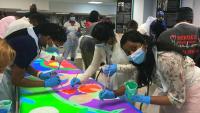Frequently Asked Questions
Harlem Hospital Center

Residency Application
Do you offer virtual interviews?
Yes, the interviews are solely virtual.
How should I prepare for the interview?
All the interviews will be conducted in Eastern Standard Time; please expect and prepare for time zone differences from your location. We will send the information link with the schedule of your interview day, ahead of time which can help you prepare.
Will there be an opportunity to interact with the residents?
Yes, a virtual social hour will be part of the interview day.
Do you pre-match applicants and participate in SOAP?
Yes, we do participate in SOAP.
What is your residency application deadline?
The application deadline would be on December 30, 2025. Interviews will be held from November 2025 to January 2026.
Residency Program
Do you accept IMG applicants?
Yes, IMGs are welcome.
Do the residents have mentors?
Each resident from their intern year is assigned a faculty mentor who guides them throughout the three years. Mentor-mentee meetings can be as often as possible, but the program requires at least two meetings per year (Spring and Fall).
What is the structure of formal didactic activities?
There are weekly Grand Rounds, weekly Academic half-days, Chief of Service conferences, Board Review conferences, Simulation conferences, and current preventive care guidelines, which are discussed during each of the residents’ continuity clinic days.
Do the residents have opportunity to participate in research?
Residents regularly engage in various scholarly activities supported by the faculty. Quality improvement rotation and Research elective are integrated into the resident curriculum. Journal Club conferences are held throughout the year.
How are the working hours?
Working hours generally varies depending on the clinical rotation the residents are on. However, the program strictly adheres to ACGME duty hours limits.
How does the program address wellness of the residents?
NYC Health and Hospital institutes a program called Helping Healers Heal (H3), a comprehensive program that supports health care providers affected by the second victimization. Structured periodic wellness activities are held. In addition, residents can also request for wellness days off.
What is your program’s stand on the issues of diversity, equity, and inclusion?
Harlem Hospital Center has a long and respected reputation as an educator of minority health professionals, including medical faculty and residents. In addition, the residents engage in yearly Cultural Competency Training to better serve a culturally diverse patient population.
What are the resident benefits?
Employment with NYC Health and Hospitals included Health insurance benefits, Transit Benefits, and other Employee Discounts and Corporate Perks. As residents, we also have the opportunity to join the Committee of Interns and Residents (CIR), which provides subsidized Dental, Vision, Outpatient Mental Health, Prescription drug, Life Insurance, Continuing Learning Program, Professional Educational Plan, Disability, and Legal Benefits.
Do you rotate at other sites?
Yes, residents have Neurology, Cardiology, and PICU rotations at Morgan Stanley Children’s Hospital New York-Presbyterian, and Hematology-Oncology Rotations at Memorial Sloan Kettering Cancer Center.
Do the residents have an opportunity to teach?
Medical students from Columbia Medical University and Physician Assistant students from CUNY also rotate in the Pediatric Floor, ED, and Clinic. With support from faculty attendings, residents supervise students in their clinical duties, give informal teaching sessions, and formal lectures. As the residents move to senior years in residency, they assume a supervisory role, applying their experience to teaching medical students and interns. PGY-3 residents have Teaching elective for four weeks and also get an opportunity to present Grand Rounds.
Do residents have ancillary support when taking care of patients?
Yes, the hospital has competent ancillary staff, which include phlebotomy, social workers, child life specialists, respiratory therapists, social workers and transporters who assist residents in patient care.
Community
Where do your residents live?
Most of the residents live around the hospital. There are plenty of housing options around the hospital, ranging from a huge apartment building and charming brownstone townhouses, all within a few minutes’ walk from the hospital. Some others chose to live within 1-2 hours away from commute – Queens, Brooklyn, Staten Island, and nearby upstate New York areas.
How does your resident go to work?
Most walk to work while some others take the MTA buses and subway. Right in front of the hospital lobby are a bus stop and the 135th subway station. There are several other bus stops within the perimetry. Some others chose to drive their own car to work and utilize street and paid parking in nearby areas.